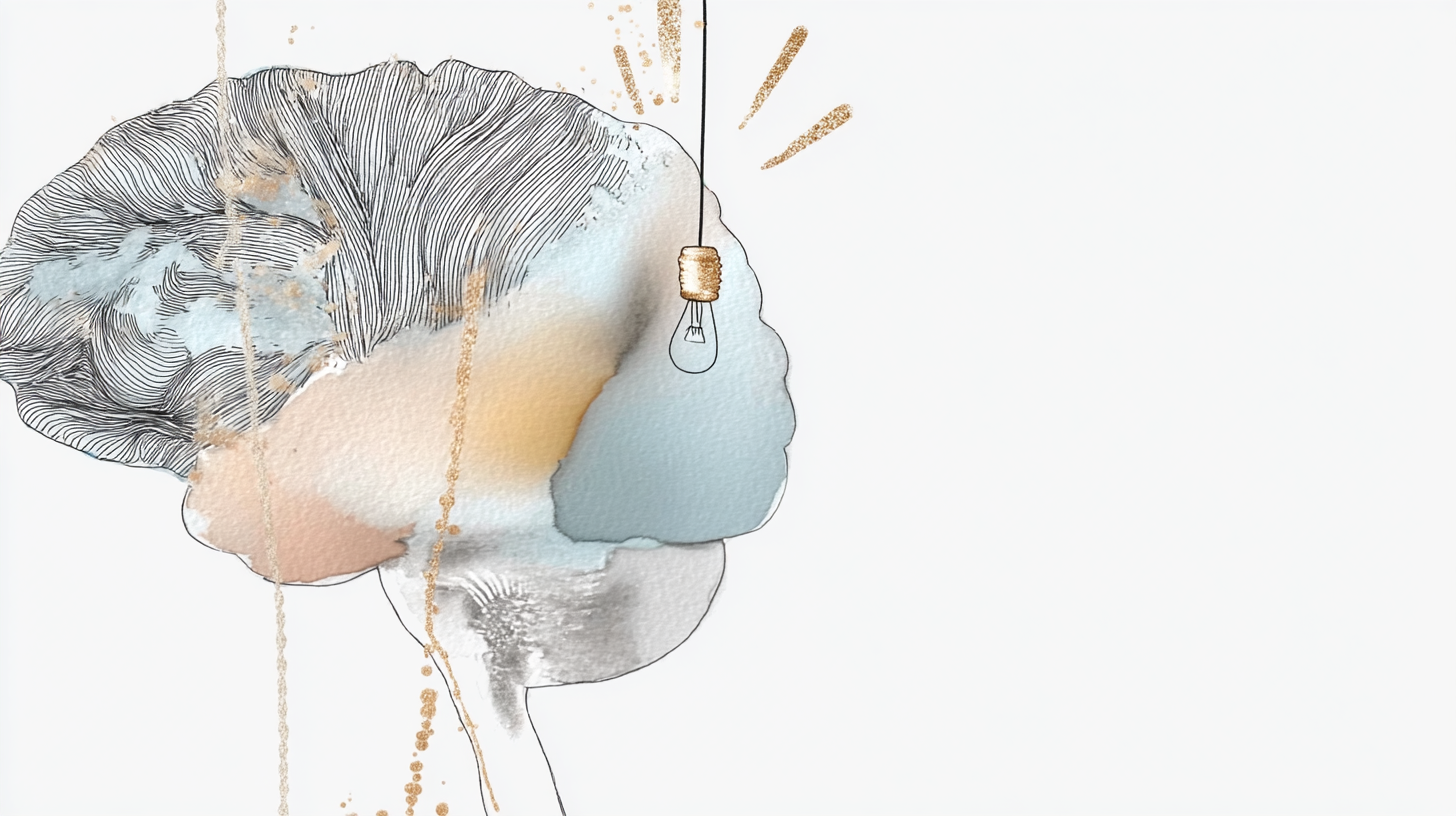Navigating a high-conflict custody case can feel like walking through a minefield. Every step is fraught with tension, every interaction can feel like a battle. It’s exhausting, emotionally draining, and creates incredible parental stress. You’re worried about your children, your finances, your future, and often, you’re dealing with an ex-partner who seems determined to make things as difficult as possible. But what if one of the biggest battles you’re fighting isn’t with your ex, or in the courtroom, but inside your own head? That constant stream of thoughts, worries, and worst-case scenarios – your internal monologue – can become an unseen battlefield, quietly sabotaging your efforts and making an already tough situation even harder. The good news is, this is one battle you have the power to win, reducing your co-parenting stress and protecting your child from parental conflict.
When you’re under the immense pressure of a custody dispute, it’s natural for your thoughts to race. You might find yourself replaying past arguments, imagining future confrontations, or constantly criticizing yourself or your ex. This internal chatter isn’t just harmless background noise. Research shows that chronic stress, often fueled by these negative thinking patterns, has a profound impact on our ability to think clearly, make good decisions, and manage our emotions. One Pennsylvania family law firm highlights that the emotional turmoil of a custody case can lead to chronic stress, which, if unchecked, can even develop into a child custody anxiety disorder. They point out that stress can drive parents to “act rashly or make poor decisions” – the last thing you need when the stakes are so high. This isn’t just a feeling; it’s a physiological response. Your body is in a constant state of high alert, and that takes a toll on your mental and physical health, directly affecting your capacity to be the parent you want to be and to navigate your legal case effectively while surviving high conflict divorce.
The Unseen Enemy: How Your Inner Voice Fuels the Fire in Co-Parenting Stress
Think of your internal monologue as the narrator of your life. In a high-conflict custody situation, this narrator can easily become a harsh critic, a prophet of doom, or an instigator of anger. This isn’t just about feeling bad; it’s about how these thoughts directly shape your reality. A meta-analysis published in the Clinical Child and Family Psychology Review found a significant link between parental stress and reduced well-being, such as lower happiness and life satisfaction. When your inner voice is constantly churning out negativity – “I can’t handle this,” “My ex is impossible,” “This is a disaster for the kids” – it’s like adding fuel to the fire of your stress. This intense stress doesn’t just stay inside; it impacts how you interact with your co-parent, your children, and even your lawyer. It can make you more reactive, less patient, and less able to see solutions for managing emotions co-parenting.
Imagine this scenario: Your co-parent is a few minutes late for a pickup. If your internal script is, “They’re doing this on purpose to provoke me! They have no respect for my time!” you’re likely to feel angry and confrontational when they arrive. This can easily escalate a minor issue into a major argument, making it harder to learn how to stop fighting with ex over child. But what if your internal script was, “Okay, they’re late. Maybe something came up. I’ll wait a few more minutes and then send a calm text if they don’t arrive”? This simple shift in self-talk can dramatically change your emotional state and your response, preventing unnecessary conflict.

Tuning In: What Are Your Negative Thought Tapes in a High-Conflict Custody Battle?
Recognizing these harmful internal scripts is the first step to changing them. In high-conflict co-parenting, certain negative thinking patterns are incredibly common. Do any of these sound familiar when dealing with your child custody anxiety?
- Catastrophizing: This is when you jump to the worst-possible conclusion. A minor disagreement becomes a sign that you’ll lose custody entirely. A child’s bad day is proof that the divorce is ruining them. For example, thinking, “If the judge sees this one angry email I sent, I’ll lose everything.”
- All-or-Nothing Thinking (Black-and-White Thinking): You see things in extremes. Your co-parent is either all bad, or (less commonly in high conflict) you feel you must be all good. There’s no room for nuance or shades of gray. “My ex never puts the children first,” or “I have to be the perfect parent to make up for my ex’s flaws.”
- Mind-Reading: You assume you know what your co-parent is thinking or what their motivations are, usually negatively. “They’re only asking for more time to reduce child support,” or “They’re deliberately trying to undermine my relationship with the kids.”
- Personalization and Blame: You either take all the blame for problems, or you blame your co-parent for everything. “It’s all my fault we’re in this mess,” or more commonly, “This entire conflict is because they are unreasonable/narcissistic/vindictive.”
- Should Statements: You have rigid rules about how you and others should behave. “They should be more flexible,” or “I shouldn’t feel so angry.”
- Emotional Reasoning: You believe that what you feel must be true. “I feel like a failure, so I must be a terrible parent.”
These thought patterns aren’t just fleeting feelings; they create a cycle. A negative thought leads to a negative emotion, which then influences your behavior, often in a way that reinforces the original negative thought. For instance, if you constantly tell yourself, “My ex will never cooperate,” you might approach every interaction with suspicion and hostility. This, in turn, makes your ex less likely to cooperate, confirming your initial belief. It becomes a self-fulfilling prophecy, all orchestrated by that unseen narrator in your head, making surviving high conflict divorce even harder.
The Ripple Effect: How Your Inner World Impacts Your Outer World (and the Impact of Parental Conflict on Child Development)
The stress generated by these negative internal dialogues isn’t just an internal experience; it has very real and damaging external consequences. Research consistently shows that high levels of parental stress and conflict are linked to negative outcomes for children. It’s not the divorce itself that typically causes the most harm, but the ongoing conflict between parents. When you are consumed by negative self-talk, your stress levels are high. This can make it harder to be patient and emotionally available for your children. They are incredibly perceptive and can pick up on your anxiety and distress, even if you try to hide it. A study highlighted in an article by the National Center for Biotechnology Information (NCBI) on parental alienating behaviors (often a feature in high-conflict cases) pointed out that children can develop anxiety disorders and trauma reactions from being exposed to such environments. Even a judge, Michael Haas, wisely noted, “every time you tell your child what an ‘idiot’ his father is, or what a ‘fool’ his mother is, you are telling the child half of him is bad.” While you might not say these things aloud, if your internal monologue is full of such sentiments, it can leak out in your tone, your body language, and your overall demeanor, impacting your child’s sense of self and security. This is a critical aspect of protecting child from parental conflict.
Furthermore, chronic stress, often worsened by relentless negative self-talk, can lead to anxiety and depression in parents. When you’re battling these mental health challenges, your capacity to make clear, rational decisions in your custody case can be compromised. You might be more prone to emotional outbursts, less able to negotiate effectively, and more likely to make choices based on fear or anger rather than what’s truly in your child’s best interest or what’s strategically sound for your case. The PA Family Law LLC article mentioned earlier specifically warns that unchecked chronic stress can develop into an anxiety disorder, affecting your ability to navigate the legal process effectively. Your internal battlefield can, therefore, directly influence the outcome of your external one.

Rewriting Your Script: The Power of Cognitive Reframing for Co-Parenting
So, how do you stop this internal saboteur? The key lies in a skill called cognitive reframing. Simply put, cognitive reframing means learning to identify those unhelpful, negative thoughts and consciously changing them into more balanced, realistic, and constructive ones. It’s not about pretending everything is perfect or ignoring real problems. It’s about challenging the often distorted and overly negative lens through which you might be viewing your situation, especially in a high-conflict custody scenario.
Here’s how you can start practicing cognitive reframing:
- Become Aware: The first step is to simply notice your thoughts. Pay attention to your internal monologue, especially during stressful interactions or when you’re feeling overwhelmed. What are you telling yourself? You could even jot down recurring negative thoughts for a few days to identify patterns.
- Challenge the Thought: Once you’ve identified a negative thought, question its validity. Ask yourself: Is this thought 100% true? Is there any evidence that contradicts it? Am I jumping to conclusions? What would I tell a friend who had this thought?
- Example Negative Thought: “My ex is always trying to make me look bad to the kids.”
- Challenge: “Is it always? Can I think of a time they said something neutral or even positive? Am I assuming their intention? Could there be another explanation for what they said or did?”
- Reframe the Thought: Replace the negative thought with a more balanced and constructive one. This new thought should be realistic and acknowledge the difficulty of the situation without catastrophizing.
- Original Thought: “This custody battle is destroying my life, and I can’t cope.”
- Reframed Thought: “This custody battle is incredibly challenging and stressful, but I am finding ways to cope. I am strong, and I will get through this. I can focus on what I can control.”
- Practice, Practice, Practice: Cognitive reframing is a skill, and like any skill, it takes practice. Be patient with yourself. It won’t happen overnight, but with consistent effort, you can start to change those ingrained negative thinking patterns.
Consider a parent who constantly thinks, “I’m going to lose my kids because my ex is a better liar in court.” This thought fuels immense child custody anxiety and might lead them to act desperately or defensively, which could indeed harm their case. Through cognitive reframing, they might shift this to: “Court is unpredictable, and it’s scary. But I have a lawyer, I am preparing my case with facts, and I will present myself honestly. I can focus on being the best parent I can be, regardless of what my ex says.” This reframed thought doesn’t deny the difficulty but empowers the parent to focus on constructive actions.

Real Stories, Real Impact: When Self-Talk Goes Wrong (and Right) in High-Conflict Divorce
The impact of negative self-talk isn’t just theoretical. While specific, identifiable case studies directly linking only self-talk to custody outcomes are hard to isolate (as many factors are at play), the patterns are clear in countless high-conflict divorces. Lawyers and mental health professionals often see parents whose internal negativity leads them to send aggressive emails, make impulsive decisions against legal advice, or become so consumed by anger that they cannot effectively co-parent or even present themselves well in court. The stress itself is a major factor; as noted by the PA Family Law LLC, the Holmes-Rahe Scale and Gadoua’s Divorce Stress Scale quantify how events like divorce and custody battles are major life stressors linked to illness. When your internal monologue is adding to this parental stress load 24/7, your resilience plummets.
Imagine a parent who, after every difficult interaction with their ex, spends hours ruminating: “They always win. I’m powerless. The system is rigged.” This internal script can lead to feelings of hopelessness and depression, potentially causing them to miss deadlines for court documents, fail to follow through on their lawyer’s advice, or appear disengaged during evaluations – all of which can genuinely harm their case. Conversely, a parent who actively works to reframe these thoughts – “This is tough, but I am not powerless. I will focus on what I can control, gather my evidence, and communicate clearly” – is more likely to take proactive, positive steps toward surviving high conflict divorce.
Your CoParentConnect Toolkit: Support for Your Inner Voice and Managing Emotions Co-Parenting
Changing deeply ingrained thought patterns is challenging, especially when you’re under extreme stress. This is where having the right tools and support can make all the difference. At CoParentConnect (coparentconnect.org), we understand the immense pressure you’re under. Our app is designed not just to help you communicate with your co-parent, but also to support your own emotional well-being and help with managing emotions co-parenting.
- Journaling: The act of writing down your thoughts and feelings can be incredibly therapeutic. Our journaling feature provides a safe, private space for you to explore your internal monologue. By getting your thoughts out of your head and onto paper (or screen), you can often see them more objectively and begin to identify those negative patterns we talked about. It’s a first step towards cognitive reframing.
- Venting Space: Sometimes you just need to let it all out. Our venting feature allows you to express your frustrations without sending them to your co-parent, preventing impulsive, emotionally charged messages that you might later regret. This can be a crucial outlet that stops your negative internal thoughts from spilling into your actual communications, helping you learn how to stop fighting with ex over child.
- 24/7 Co-Parenting Coach: Perhaps the most powerful tool for tackling negative self-talk is our AI-powered 24/7 coach. When you’re struggling with a difficult thought, feeling overwhelmed, or unsure how to respond to a situation, our coach is there to help. It can guide you through reframing exercises, help you analyze situations more objectively, and assist you in composing messages that are calm, factual, and child-focused. Think of it as having a supportive guide available anytime you need to challenge that negative inner voice and find a more constructive path forward.
Using these features can help you interrupt the cycle of negative thinking, reduce your co-parenting stress levels, and approach your co-parenting and custody situation with a clearer, more empowered mindset. Discover how at coparentconnect.org.
Winning the Real Battle: Peace for You and Your Children by Protecting Child from Parental Conflict
High-conflict custody cases are undeniably tough. But by recognizing the power of your internal monologue and actively working to make it an ally rather than an enemy, you can significantly change your experience and your outcomes. It’s about shifting your focus from the battles you can’t control (like your ex’s behavior) to the one you can: the battle within your own mind. When you learn to manage your negative self-talk, you reduce your stress, improve your decision-making, become a more present and effective parent, and ultimately, create a more peaceful environment for your children, effectively protecting child from parental conflict.
This isn’t about pretending the difficulties don’t exist. It’s about equipping yourself with the mental and emotional skills to navigate those difficulties with greater strength and resilience. Your children deserve a parent who is not only fighting for them but is also fighting for their own peace of mind. By taking control of your inner voice, you’re not just helping your case; you’re investing in your well-being and the well-being of your children for years to come. And with tools like CoParentConnect, available at coparentconnect.org, you don’t have to do it alone.
References:
- Clinical Child and Family Psychology Review (for meta-analysis on parental stress)
- National Center for Biotechnology Information (NCBI) (for study on parental alienating behaviors)
- PA Family Law LLC (article on Stress and Anxiety of Child Custody)
- (Mention of Judge Michael Haas’s quote)
- (Mention of Holmes-Rahe Scale and Gadoua’s Divorce Stress Scale)



